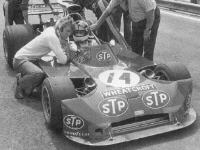A look back in time on the day that changed GP racing's views on safety
Roger Williamson: unnecessary casualty
Author
- Mattijs Diepraam
Date
- September 9, 2004
Related articles
- 1973 Dutch GP - A look back in time on the day that changed GP racing's views on safety, by Mattijs Diepraam
- Part 1: Track safety in the 70s - Stone age in the space age
- Part 2: July 29, 1973 - The day duty won over heroism
- Part 4: David Purley - Death-defying paratrooper, bloody hero
- Part 5: 1970 Dutch GP - Advance warning
- March - Customer care, by Mattijs Diepraam
- David Purley - Army heroics to car heroics, by Marc Ceulemans
- Roger Williamson - Unnecessary casualty, by Mattijs Diepraam/Raimon Durán
- Zandvoort - The quintessential GP track in the dunes, by Mattijs Diepraam
Who?Roger Williamson What?March-Cosworth 731 Where?Zandvoort When?XXI Dutch GP, practice (July 28, 1973) |
 |
Why?
The early seventies formed a period of carnage for British motorsport. It said goodbye to Piers Courage in 1970 before losing more budding talent at a moment in their lives and careers comparable to that of Chris Bristow – another bright star shot down from the sky in 1960, having taken part in just three World Championship entries. Eventually, Britain would prevail with James Hunt taking the 1976 World Championship, but perhaps "Hunt the Shunt" was the least likely to succeed amongst a trio of hugely talented Brits trying to make it to the top without any major backing.
Tony Brise was killed in an aeroplane accident in November 1975, along with his team boss Graham Hill, Embassy Hill designer Andy Smallman and three mechanics, on their return to England from testing at Paul Ricard. That was another blow to Britain, which had already lost Roger Williamson.
Roger Williamson was a karting star before moving up to car racing. He quickly made his name racing a Ford Anglia in touring-car events before being taken under the wings of Leicester building contractor and Donington Park track owner Tom Wheatcroft. In 1971 the duo entered British F3 with a March 713M. Roger immediately took the Lombank title before cleaning up both British championships in 1972. Here was a man to watch.
At first, 1973 was intended exclusively to be a year of F2. A slow start with the underperforming GRD was followed by a magical win at the Monza Lotteria race after a switch to the dominant March chassis. He was well on his way to victory at Misano when engine problems intervened but he had now truly established himself as a star of the future. Earlier than expected and planned the opportunity arose to move into F1 after Jean-Pierre Jarier and Henri Pescarolo deserted the No.14 March car. This was one of March's worst seasons ever, the team ploughing on in the 731 also run by private teams Lec, Hesketh and Clarke-Mordaunt-Guthrie-Durlacher.
The 731 was in fact an adapted F2-style 721G, the same car that had been pioneered by Mike Beuttler for the CMGD team. Young master Hunt, in Hesketh's 731, was the one driver making good progress in the car, but that was due to the team's engineering wizard Harvey Postlethwaite making all sorts of self-styled performance modifications. The "works" 731, however, wasn't such a great car, but mentor Tom Wheatcroft believed that renting the vacated car would still be useful for Roger, as he would get some top-level experience under his belt before embarking on a proper Grand Prix assault in 1974.
Roger's Grand Prix debut would come at the British GP but he failed to make the restart after the infamous Jody Scheckter-induced pile-up at Silverstone's Woodcote corner. Therefore his real race debut would come at Zandvoort where the STP March/Tom Wheatcroft Racing entry had been changed into full works status. Having lined up 18th on the grid, just ahead of Chris Amon's Tecno and local hero Gijs van Lennep, Roger soon found himself battling fellow 731 racer David Purley, who had started 21st. On lap 8 events took a horrible turn.
- Part 1: Track safety in the 70s - Stone age in the space age
- Part 2: July 29, 1973 - The day duty won over heroism
- Part 4: David Purley - Death-defying paratrooper, bloody hero
- Part 5: 1970 Dutch GP - Advance warning
Other Roger Williamson pages
- Roger Williamson Bio, by Anton Sukup
- Roger Williamson Tribute, by Matthew Lawrenson
